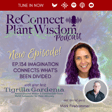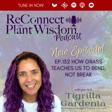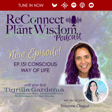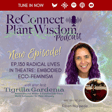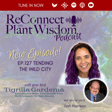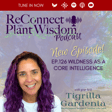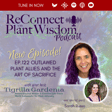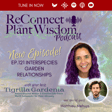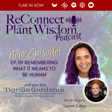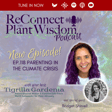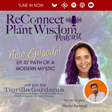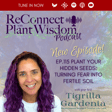
Ep.125 Nature Spirits Gone Rogue with Laurel Colless
What if stories of monsters could help us see climate change in a new light?
In this conversation with fantasy author Laurel Colless, we explore her magical eco-fiction series that uses imagination, environmental awareness, and the voices of nature spirits to help children (and us adults!) reconnect with the living world.
You’ll discover how fantasy can carry truth, how “nature spirits gone rogue” reveal our own relationship with consumption, and why nurturing imagination is essential for the next generation.
What You’ll Learn About Eco Fantasy Fiction for Climate Awareness
🌱 Why fantasy fiction is a powerful way to tell climate truths
🌱 How monsters reflect human choices and ecological imbalance
🌱 The role of plant communication and “tree speakers” in reimagining connection
🌱 Why fostering imagination is essential for hope and resilience
✨ Resources ✨
🌱 Expanded Show Notes
🌱 Laurel Colless book series (Eye of the Storm Lord, Renegale Tales, Knights Unite)
🌱 Naturally Conscious Community (courses, discussions, events)
🌱 Plant Wisdom Book Club
👤 Guest Spotlight: Laurel Colless, Children's Author → laurelcolless.com
Australian-New Zealander children’s author Laurel Colless grew up with books as her friends. Always a fan of adventure stories with twists, Laurel reverts to her eleven-year-old self when writing the Peter Blue books, a science fantasy series where a group of friends at an eco-school solve big world problems and battle evil climate demons birthed from human garbage dumps.
A literary-comparatist by education, Laurel spent 25 years working in environmental business and journalism in Asia, the US and Europe, before coming back to writing. She is the founder of the Carbon Busters Club, a kids’ climate-science program that combines storytelling with science education. In 2013, Laurel Colless became an Al Gore Climate Reality Leader.
When Laurel is not writing or busting carbon, she likes reading, watching movies, forest walking with her dog (and sometimes even her cat!) and spending time with her teenage daughters. Laurel now makes her home in Helsinki with her Finnish husband, their two daughters, a wiry-haired dachshund and a rescue cat.
✨ Chapters ✨
00:00 Introduction
08:10 Essential Nature & Belief
16:30 Plasticity & Acceptance
24:45 Self-Awareness Tools
32:55 Natural Rhythms
40:17 Ad: Music of Plants
49:30 Plant Types & Self-Quiz
57:30 Closing & Community
🔗 Connect & Explore More
🌿 Website
🌿 Contact
🌿 Shop Eco-Conscious Partners
Socials
📸 Instagram
📘 Facebook
💼 LinkedIn
▶️ YouTube
🎵 Credits
Opening + Closing music by @Cyberinga and Poinsettia

